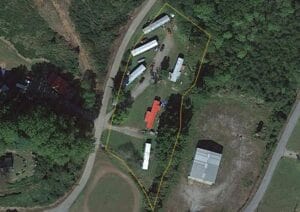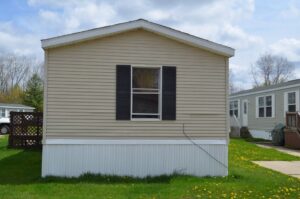Have you ever wondered what exactly is a mobile home lot? It’s the specific piece of land within a mobile home community that homeowners pay to use. In this article Mobile Home Lot Rent: A Complete Guide we will discuss all the questions you may have regarding lot rent.

Mobile Home Lot Rent
This fee, known as mobile home lot rent, is typically paid on a monthly basis and can vary depending on factors such as location and amenities. Mobile home communities often offer several different types of lots for residents to choose from, including single-wide or double-wide options. Some communities may have sections or additions with higher-end amenities that come with a higher price tag. If you’re in the market for renting a mobile home, it’s important to understand the cost of lot rent and how it can impact your overall expenses.
Understanding Mobile Home Lot Rent and Its Purpose
What is mobile home lot rent?
Lot rent is a monthly payment made by mobile home owners to lease the land on which their homes sit. This fee is separate from mortgage payments or other financing arrangements for the mobile home itself.
What does mobile home lot rent cover?
The purpose of lot rent is to cover the cost of maintaining the community and providing services such as trash removal and landscaping. Lot rent can vary depending on factors such as location, amenities, and local market conditions.
In some cases, lot rent may also include access to community facilities like swimming pools, playgrounds, or fitness centers. It’s important for mobile home owners to understand exactly what their lot rent covers so they can budget accordingly.
What is in the mobile home lot rent lease?
When signing a lease agreement for a mobile home park or community, it’s important to carefully review the terms and conditions related to lot rent. This will typically include information about:
-
The amount of lot rent due each month
-
Any late fees or penalties for missed payments
-
Rules around using common areas or facilities
-
Restrictions on modifications or improvements to the mobile home or surrounding property
-
Requirements around upkeep and maintenance of the property
Understanding these terms can help avoid any misunderstandings or disputes with landlords down the line.
Responsibility For Paying Mobile Home Lot Rent
Mobile home owners are responsible for paying their lot rent on time each month. Failure to do so could result in late fees, interest charges, or even eviction from the property. It’s important to prioritize making this payment each month in order to maintain good standing with your landlord and avoid any negative consequences that could impact your ability to continue living in your mobile home.Have you ever wondered what exactly is a mobile home lot? It’s the specific piece of land within a mobile home community that homeowners pay to use. In this article Mobile Home Lot Rent: A Complete Guide we will discuss all the questions you may have regarding lot rent.

Average Rates and Fees For Mobile Home Lot Rent
If you’re considering moving into a mobile home park, one of the most significant expenses you’ll encounter is the lot rent. Lot rent refers to the monthly fee that residents pay to lease the land on which their mobile homes sit.
What is the average mobile home lot rent?
According to recent estimates, the average mobile home lot rent in the US ranges from $300-$500 per month. This fee typically covers basic services like water, sewer, and trash removal. However, it’s worth noting that some states have higher average lot rent rates than others.
Average lot rent for mobile homes continued.
California has one of the highest average lot rents in the country, with an estimated cost of $800 per month. Other states with above-average rates include Florida ($600/month), Arizona ($550/month), and Colorado ($500/month). On the other hand, some states have lower-than-average costs for mobile home lots. For example, in Indiana and Iowa, residents can expect to pay around $200-$300 per month.
How much does it cost to rent a mobile home lot?
In addition to basic services like water and trash removal, many mobile home parks offer additional amenities that can drive up monthly costs. For example, some parks may provide access to a clubhouse or community center where residents can gather for events or activities. Others may offer on-site maintenance services or security patrols.
As a result of these added features, it’s not uncommon for some parks’ monthly fees to exceed $1,000 per month. However, keep in mind that these high-end options are usually reserved for luxury communities with extensive amenities.
Late payment fees for mobile home lot rent
It’s essential to note that failing to pay your monthly mobile home lot rental fee on time can result in late payment fees. These charges can range from $25-$75 per month, depending on the park’s policies. If you’re unable to pay your rent on time, be sure to communicate with the park management as soon as possible.

Factors Affecting Mobile Home Lot Rent Rates
If you are planning to live in a mobile home, it’s important to understand the factors that affect lot rent rates. The cost of lot rent can vary based on different factors such as location, size of the lot, and services covered by the fee.
Location
One of the most significant factors affecting lot rent rates is location. Lot rents can be higher in urban areas compared to rural areas due to higher property values and demand for housing. For example, if you are looking for a mobile home park located near a city center or popular tourist destination, you should expect to pay more for lot rent than if you were living in a rural area.
Size of the Lot
Another factor that affects lot rent rates is the size of the lot. Larger lots will generally have higher monthly fees than smaller ones. This is because larger lots take up more space and require more maintenance and upkeep.
Services Covered by Mobile Home Lot Rent Fees
Lot rent fees may cover different services depending on the agreement between landlord and tenant. Some common services covered by lot rent fees include water, sewer, trash removal, lawn care, snow removal, and security services. It’s important to ask your landlord what services are included in your lot rent fee so that there are no surprises later on.
Lot Rent Increases
Lot rents can increase annually or at any time throughout your tenancy period depending on your rental agreement with your landlord. It’s essential to understand how often increases occur before signing a lease agreement so that you can plan accordingly for any potential changes in cost.
Average Lot Rent Cost
The average cost of lot rent varies from state to state but typically ranges from $200-$800 per month depending on location and amenities provided by the park management team. If you’re not sure about average costs in your area or want an idea of what to expect, you can search online for mobile home parks in your area and compare prices.
What is Covered by Mobile Home Lot Rent?
As mentioned earlier, lot rent fees cover different services depending on the agreement between landlord and tenant. Some common services covered by lot rent fees include water, sewer, trash removal, lawn care, snow removal, and security services. It’s essential to ask your landlord what services are included in your lot rent fee so that there are no surprises later on.
What Lot Rent Will Not Cover
It’s important to note that not everything will be covered by lot rent fees. For example, if you need repairs or maintenance inside of your mobile home unit or want to make any upgrades or additions to the property like a deck or fence, those costs will be separate from the monthly lot rent fee.
Mobile Home Park’s Right to Raise Lot Rent and Cost of Lot Rent
Mobile Home Park Owner’s Right to Increase Lot Rent Charges
Owners have the right to increase lot rent charges. However, they must follow specific guidelines and regulations set by the state or local government. The landlord must provide a written notice of the rent increase at least 30 days before it takes effect in most states. In some states, like California, landlords must provide 60 days’ notice if the rent increase is more than 10%.
The Cost of Lot Rent May Include Reasonable Charges for Cable TV and Other Amenities
Lot rent may also include reasonable charges for cable TV and other amenities provided by the mobile home park owner. These amenities may include swimming pools, playgrounds, fitness centers, laundry facilities, and others. However, these additional fees should be reasonable and not excessive.

Residents May Face Relocation Expenses if They Cannot Afford the Increased Lot Rent
If residents cannot afford the increased lot rent, they may face relocation expenses. Moving a mobile home can be costly as it requires special permits and equipment to move them safely. Moreover, finding another mobile home park with affordable lot rents can be challenging.
When considering moving your mobile home due to increased lot rent costs:
Check your lease agreement: Your lease agreement may specify how much notice you need to give before moving out.
Consider negotiating with your landlord: You can try negotiating with your landlord about reducing the increased amount or spreading it over time.
Contact a lawyer: If you feel that your landlord is unfairly increasing your lot rent or violating any laws or regulations related to rental increases, contact a lawyer who specializes in housing law.
How Much Can a Mobile Home Park Raise Lot Rent?
The amount that a mobile home park owner can raise their lot rents varies depending on state laws and regulations. Some states allow landlords to raise their rents by any amount they want, while others have specific rules and regulations on how much they can increase the rent.
In California, for example, landlords cannot increase their rents by more than 5% plus the percentage change in the cost of living index. In Oregon, landlords must provide a 90-day notice before increasing the rent by more than 10%. In Texas, there are no state laws regulating mobile home park lot rent increases.
Laws and Regulations Surrounding Mobile Home Lot Rents
Mobile homes have become a popular choice for many people looking for affordable housing. However, there are laws and regulations that must be followed. These laws govern how mobile home parks operate and the rights of mobile home owners.
Provisions Set Out by the Law Regarding Lot Rent
Mobile home owners must comply with provisions set out by the law regarding lot rent. This means that they must pay their rent on time and follow all other rules and regulations set out by the park management. Failure to do so may lead to eviction from the mobile home park.
The law also outlines what can be included in lot rent. For example, some parks may include utilities such as water, sewer, and garbage collection in their lot rent fees. Other parks may charge separate fees for these services.
Protection from Unfair Utility Charges
Manufactured home owners have rights under the law, including protection from unfair utility charges. The park management cannot charge more than what is reasonable for utilities or require residents to pay for services they do not use.
If you feel that you are being charged unfairly for utilities or other services, you should contact your local housing authority or an attorney who specializes in mobile home law.
Process for Removal of a Mobile Home
The law also outlines the process for removal of a mobile home from a lot in case of non-payment or other violations. If a mobile home owner fails to pay their lot rent or violates any other provisions set out by the park management, they may face eviction.
However, before an eviction can take place, certain procedures must be followed. The park management must provide written notice to the resident stating why they are being evicted and give them a certain amount of time to correct any problems.
If the resident does not comply with these requests, then legal action can be taken to remove them from their lot. It is important to note that mobile home owners have rights and should consult with an attorney if they feel their rights are being violated.
You might be interested in our article: How to Remodel a Mobile Home To Look Like a House
Taxes on Mobile Homes
One common question that arises. The answer varies depending on the state and local laws.
In some states, mobile homes are classified as personal property and are subject to personal property taxes. In other states, they may be considered real property and taxed as such.
It is important for mobile home owners to understand the tax laws in their area so that they can properly budget for these expenses.
Rights and Responsibilities of Park Owner and Renter
Park Owner’s Responsibility to Provide a Written Rental Agreement to Tenants
A rental agreement is a legal contract between the park owner and the tenant. It outlines the terms and conditions of tenancy, such as rent payment, lease duration, pet policy, maintenance responsibilities, and other essential details. The park owner must provide a written rental agreement to tenants before they move in or sign the lease. This document protects both parties’ interests by ensuring that everyone understands their rights and obligations.
Tenant’s Responsibility to Pay Site Rent on Time as per Lease Terms
Tenants are responsible for paying site rent on time as per lease terms. If they fail to do so, the park owner may charge late fees or take legal action against them. Therefore, it is crucial for tenants to understand their financial obligations and budget accordingly. They should also communicate with the park owner if they face any financial hardship or difficulty in paying rent.
Park Owner’s Right to Evict Tenants for Violating Lease Agreement
The park owner has the right to evict tenants for violating the lease agreement. Common reasons for eviction include non-payment of rent, property damage, illegal activities, and violation of community rules. However, the eviction process can be lengthy and complicated. Before taking any legal action, the park owner must follow state laws regarding eviction notices, hearings, appeals, etc.
Tenant’s Right to Receive Notice Before Any Rent Increase by Park Owner
Tenants have the right to receive notice before any rent increase by the park owner. Most states require a 30-day notice period before raising rents. However, some states may have different regulations regarding this matter. Any tenant should read their lease agreements carefully and consult with local housing authorities if they have any questions or concerns about rent increases.
Park Owner’s Responsibility to Maintain and Repair Park Amenities
The park owner is responsible for maintaining and repairing park amenities, such as roads, sidewalks, lighting, landscaping, playgrounds, etc. These amenities enhance the quality of life for tenants and attract more residents to the community. Therefore, the park owner must allocate sufficient resources and manpower to ensure that these facilities are safe, clean, and functional.
All You Need To Know About Mobile Home Lot Rent
In conclusion, understanding the ins and outs of mobile home lot rent is essential for both park owners and renters. The average rates and fees for lot rent can vary depending on several factors such as location, amenities, and utilities. It’s important to note that mobile home parks have the right to raise lot rent prices, but they must follow state laws and regulations.
As a renter, it’s crucial to understand your rights and responsibilities. You have the right to receive proper notice before any changes in pricing occur. You are responsible for maintaining your mobile home and keeping up with payments.
Overall, mobile home lot rental is an affordable housing option for many individuals and families. By educating yourself on the laws and regulations surrounding lot rent prices, you can make informed decisions about where to live.
Mobile Home Lot Rent FAQs:
Q: Can a park owner evict me if I don’t pay my lot rent?
A: Yes, a park owner has the right to evict you if you fail to pay your lot rent on time. However, they must follow state laws regarding eviction procedures.
Q: Can a park owner charge extra fees on top of my monthly lot rent?
A: Yes, some park owners may charge additional fees for amenities or utilities such as water or trash collection.
Q: What happens if my mobile home becomes damaged due to natural disasters or accidents?
A: As a tenant, it is your responsibility to maintain your mobile home. If damage occurs due to natural disasters or accidents, you will be responsible for repairing or replacing the damages.
Q: Are there any government programs available for assistance with paying lot rent?
A: Yes, there are some government programs available that provide financial assistance with housing costs including lot rent.
Q: Can I negotiate my lot rent price with the park owner?
A: It is possible to negotiate lot rent prices with the park owner, but it ultimately depends on the specific park’s policies and regulations.
What is the average lot rent for a mobile home?
The average lot rent for a mobile home park can vary widely depending on factors such as location, amenities, and the local real estate market. As of my last knowledge update in January 2022, lot rents in the United States typically ranged from approximately $200 to $800 per month or more. However, these figures can fluctuate significantly, and in some high-demand or urban areas, lot rents may be higher.
You might also be interested in our articles:
